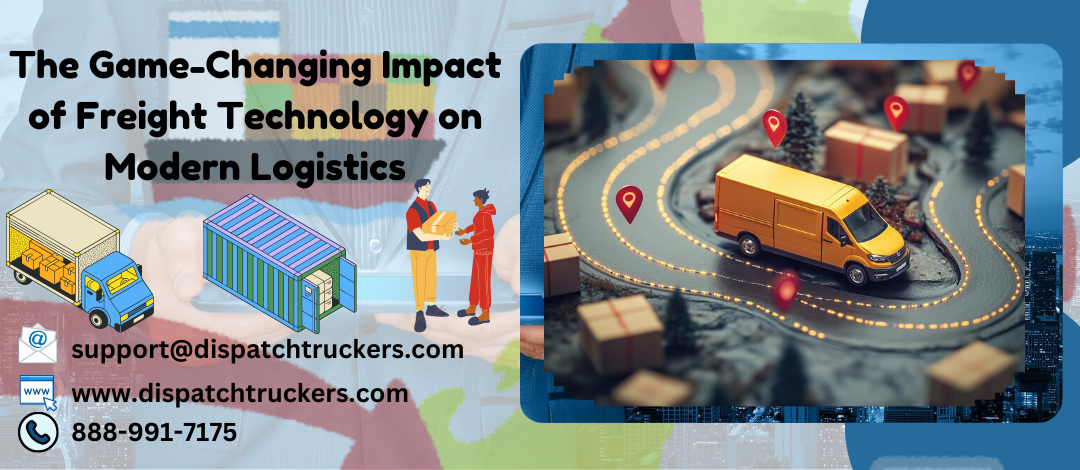
The Game-Changing Impact of Freight Technology on Modern Logistics
Efficiency, transparency and speed are key to success in the high-speed world of logistics. With the increase in customer expectations for faster delivery time and excellent service, the freight industry has turned towards advancing technology to revolutionize their operations. This blog explores how leading freight technology is changing logistics for the betterment of operations and sustainability.
Quick Glimpse and Monitor Tracking in Real-Time
Real-time visibility is another game changer in the technology application for managing freight. In the past, beneficiaries and shippers were left uninformed about their load over its course of travel. Through GPS / Cellular Tower via driver phone tracking and with the use of Transportation Management Systems (TMS), every detail about a shipment is traceable.
Real-time tracking like this allows logistics businesses to provide accurate information about the package location, foresee delays, and change routes if necessary. Enabling real-time takes transparency and efficiency to the next level, giving shippers accurate tracking information.
The Future of Freight Management – Automation/AI
New technologies such as automation and artificial intelligence (AI) have revolutionized freight management, enabling smooth operations. The use of algorithms powered by AI helps freight brokers better match loads, forecast demand, and optimally utilize capacity. Built on analyzing historical data, market trends, and real-time information, these systems recommend the best routes to cut down transit times.
Invoicing, freight documentation, and all communications are other everyday tasks that automated tools accomplish with much greater accuracy than a human and in far less time. AI also allows predictive analytics, providing companies with the ability to be alert to potential disruptions (e.g., weather, mechanical issues, or supply chain bottlenecks) and circumvent them from happening.
Social and Environmental Sustainability
Sustainability is an increasing issue for logistics companies as well as their customers. New technologies help the industry lessen its environmental impact. Electric or hybrid trucks are making inroads, providing a cleaner alternative where gas-guzzling diesel power is usually the norm. Route optimization software also optimizes routes and dispatches more efficiently to reduce fuel consumption by cutting idling time and distances.
Moreover, freight companies are using AI to decrease emissions by analyzing data to help them figure out the most efficient routes. This benefits logistics providers, helping them align with societal sustainability targets while keeping their services cost-effective.
Centralized, Cloud-Based Communication and Collaboration
In logistics, communication must be effective and efficient throughout the chain of stakeholders to keep everyone on the same page. The advent of cloud-based platforms and digital freight marketplaces has made it easier to work together by centralizing data and communication. Shipwell and Parade are two examples of such platforms where shippers, carriers, and brokers have real-time visibility into their loads from booking to delivery through smart document management systems.
This improved communication results in better load planning, reduced empty miles, and better service overall. Furthermore, these tools facilitate real-time reviews and help businesses make informed decisions, thereby mitigating any necessary changes or preventing issues at very early stages.
The Future of Freight Technology
Meanwhile, the freight industry continues to innovate at a rapid pace. Supply chain traceability, including stringent batch-wise monitoring, could be transformed by technologies like blockchain, while 5G connectivity will boost real-time data exchange even further. Implementing these technologies will give companies a competitive edge in logistics.
Some of the biggest names in logistics are starting to use the latest technology that industry leaders have developed. This enables them to offer a higher class of service, melding cutting-edge equipment and a strong dedication to efficiency with sustainability. Access to these innovations is how companies like ours stay at the forefront, maximizing efficiency and ensuring clients enjoy reduced costs and intelligent logistics solutions.
Conclusion
The adoption of advanced freight technology is transforming logistics, making it more efficient, transparent, and sustainable. As businesses continue to push for faster and greener solutions, logistics companies must adapt to remain competitive. Those that embrace innovation will thrive in this dynamic, tech-driven landscape, providing unparalleled service to their clients.
